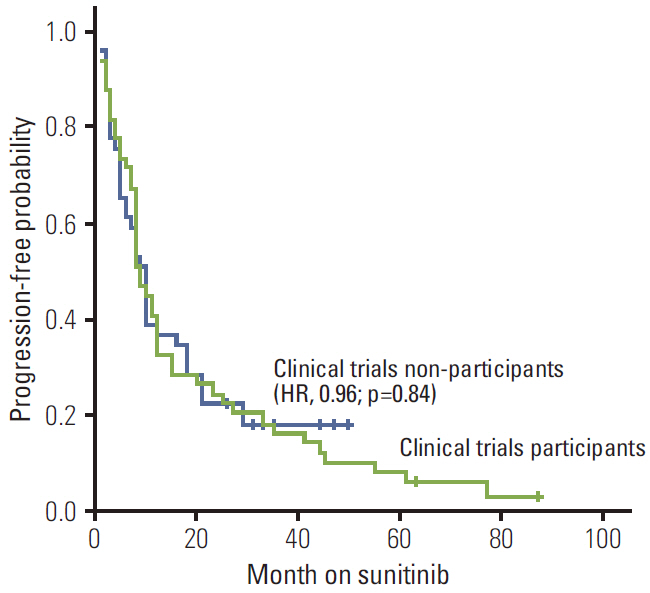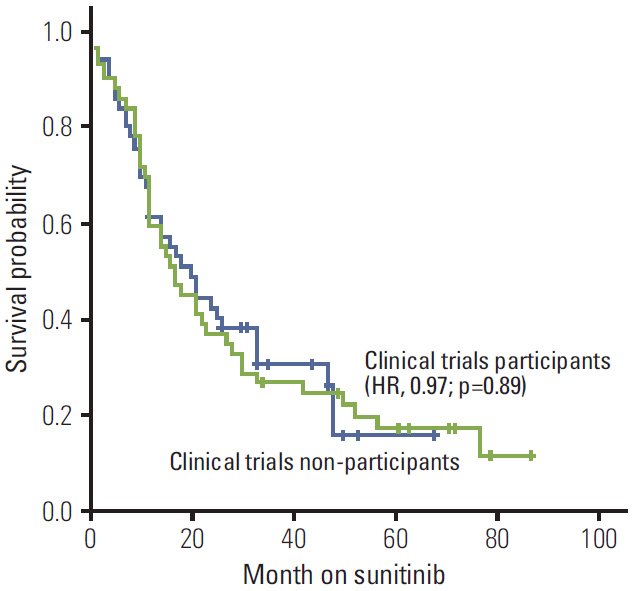Cancer Res Treat.
2016 Jan;48(1):281-287. 10.4143/crt.2014.289.
Is there a "Trial Effect" on Outcome of Patients with Metastatic Renal Cell Carcinoma Treated with Sunitinib?
- Affiliations
-
- 1Genitourinary Oncology Service, Institute of Oncology, Meir Medical Center, Sackler School of Medicine, Tel Aviv University, Kfar Saba, Israel. danielkeizman@gmail.com
- KMID: 2152286
- DOI: http://doi.org/10.4143/crt.2014.289
Abstract
- PURPOSE
Studies suggested the existence of a 'trial effect', in which for a given treatment, participation in a clinical trial is associated with a better outcome. Sunitinib is a standard treatment for metastatic renal cell carcinoma (mRCC). We aimed to study the effect of clinical trial participation on the outcome of mRCC patients treated with sunitinib, which at present, is poorly defined.
MATERIALS AND METHODS
The records of mRCC patients treated with sunitinib between 2004-2013 in 7 centers across 2 countries were reviewed. We compared the response rate (RR), progression free survival (PFS), and overall survival (OS), between clinical trial participants (n=49) and a matched cohort of non-participants (n=49) who received standard therapy. Each clinical trial participant was individually matched with a non-participant by clinicopathologic factors. PFS and OS were determined by Cox regression.
RESULTS
The groups were matched by age (median 64), gender (male 67%), Heng risk (favorable 25%, intermediate 59%, poor 16%), prior nephrectomy (92%), RCC histology (clear cell 86%), pre-treatment NLR (>3 in 55%, n=27), sunitinib induced hypertension (45%), and sunitinib dose reduction/treatment interruption (41%). In clinical trial participants versus non-participants, RR was partial response/stable disease 80% (n=39) versus 74% (n=36), and progressive disease 20% (n=10) versus 26% (n=13) (p=0.63, OR 1.2). The median PFS was 10 versus 11 months (HR=0.96, p=0.84), and the median OS 23 versus 24 months (HR=0.97, p=0.89).
CONCLUSION
In mRCC patients treated with sunitinib, the outcome of clinical trial participants was similar to that of non-participants who received standard therapy.
Figure
Reference
-
References
1. Li L, Kaelin WG Jr. New insights into the biology of renal cell carcinoma. Hematol Oncol Clin North Am. 2011; 25:667–86.2. Massari F, Bria E, Maines F, Milella M, Giannarelli D, Cognetti F, et al. Adjuvant treatment for resected renal cell carcinoma: are all strategies equally negative? Potential implications for trial design with targeted agents. Clin Genitourin Cancer. 2013; 11:471–6.
Article3. Herrmann E, Weishaupt C, Poppelmann B, Hillgruber C, Puhse G, Krabbe LM, et al. New tools for assessing the individual risk of metastasis in renal cell carcinoma. Clin Exp Metastasis. 2013; 30:215–24.
Article4. Motzer RJ, Hutson TE, Tomczak P, Michaelson MD, Bukowski RM, Rixe O, et al. Sunitinib versus interferon alfa in metastatic renal-cell carcinoma. N Engl J Med. 2007; 356:115–24.
Article5. Tanai C, Nokihara H, Yamamoto S, Kunitoh H, Yamamoto N, Sekine I, et al. Characteristics and outcomes of patients with advanced non-small-cell lung cancer who declined to participate in randomised clinical chemotherapy trials. Br J Cancer. 2009; 100:1037–42.
Article6. Field KM, Drummond KJ, Yilmaz M, Tacey M, Compston D, Gibbs P, et al. Clinical trial participation and outcome for patients with glioblastoma: multivariate analysis from a comprehensive dataset. J Clin Neurosci. 2013; 20:783–9.
Article7. Braunholtz DA, Edwards SJ, Lilford RJ. Are randomized clinical trials good for us (in the short term)? Evidence for a "trial effect". J Clin Epidemiol. 2001; 54:217–24.
Article8. Goyal J, Nuhn P, Huang P, Tyagi P, Oh D, Carducci MA, et al. The effect of clinical trial participation versus non-participation on overall survival in men receiving first-line docetaxel-containing chemotherapy for metastatic castration-resistant prostate cancer. BJU Int. 2012; 110(11 Pt B):E575–82.
Article9. Peppercorn JM, Weeks JC, Cook EF, Joffe S. Comparison of outcomes in cancer patients treated within and outside clinical trials: conceptual framework and structured review. Lancet. 2004; 363:263–70.
Article10. Rajappa S, Gundeti S, Uppalapati S, Jiwatani S, Abhyankar A, Pal C, et al. Is there a positive effect of participation on a clinical trial for patients with advanced non-small cell lung cancer? Indian J Cancer. 2008; 45:158–63.
Article11. Rochon J, du Bois A. Clinical research in epithelial ovarian cancer and patients' outcome. Ann Oncol. 2011; 22 Suppl 7:vii16–9.
Article12. Patil S, Figlin RA, Hutson TE, Michaelson MD, Negrier S, Kim ST, et al. Prognostic factors for progression-free and overall survival with sunitinib targeted therapy and with cytokine as first-line therapy in patients with metastatic renal cell carcinoma. Ann Oncol. 2011; 22:295–300.
Article13. Motzer RJ, Bukowski RM, Figlin RA, Hutson TE, Michaelson MD, Kim ST, et al. Prognostic nomogram for sunitinib in patients with metastatic renal cell carcinoma. Cancer. 2008; 113:1552–8.
Article14. Choueiri TK, Plantade A, Elson P, Negrier S, Ravaud A, Oudard S, et al. Efficacy of sunitinib and sorafenib in metastatic papillary and chromophobe renal cell carcinoma. J Clin Oncol. 2008; 26:127–31.
Article15. Rini BI, Cohen DP, Lu DR, Chen I, Hariharan S, Gore ME, et al. Hypertension as a biomarker of efficacy in patients with metastatic renal cell carcinoma treated with sunitinib. J Natl Cancer Inst. 2011; 103:763–73.
Article16. Heng DY, Xie W, Regan MM, Warren MA, Golshayan AR, Sahi C, et al. Prognostic factors for overall survival in patients with metastatic renal cell carcinoma treated with vascular endothelial growth factor-targeted agents: results from a large, multicenter study. J Clin Oncol. 2009; 27:5794–9.
Article17. Keizman D, Huang P, Eisenberger MA, Pili R, Kim JJ, Antonarakis ES, et al. Angiotensin system inhibitors and outcome of sunitinib treatment in patients with metastatic renal cell carcinoma: a retrospective examination. Eur J Cancer. 2011; 47:1955–61.
Article18. Keizman D, Ish-Shalom M, Huang P, Eisenberger MA, Pili R, Hammers H, et al. The association of pre-treatment neutrophil to lymphocyte ratio with response rate, progression free survival and overall survival of patients treated with sunitinib for metastatic renal cell carcinoma. Eur J Cancer. 2012; 48:202–8.
Article19. Keizman D, Gottfried M, Ish-Shalom M, Maimon N, Peer A, Neumann A, et al. Active smoking may negatively affect response rate, progression-free survival, and overall survival of patients with metastatic renal cell carcinoma treated with sunitinib. Oncologist. 2014; 19:51–60.
Article20. Koschmann C, Thomson B, Hawkins DS. No evidence of a trial effect in newly diagnosed pediatric acute lymphoblastic leukemia. Arch Pediatr Adolesc Med. 2010; 164:214–7.
Article21. Abu-Hejleh T, Chrischilles EA, Halfdanarson TR, Simon C, Pendergast JF, Jiang D, et al. The effect of receiving treatment within a clinical trial setting on survival and quality of care perception in advanced stage non-small cell lung cancer. Am J Clin Oncol. 2014; Mar. 13. [Epub]. http://dx.doi.org/10.1097/COC.0000000000000029.
Article22. Unger JM, Barlow WE, Martin DP, Ramsey SD, Leblanc M, Etzioni R, et al. Comparison of survival outcomes among cancer patients treated in and out of clinical trials. J Natl Cancer Inst. 2014; 106:dju002.
Article23. Chow CJ, Habermann EB, Abraham A, Zhu Y, Vickers SM, Rothenberger DA, et al. Does enrollment in cancer trials improve survival? J Am Coll Surg. 2013; 216:774–80.
Article
- Full Text Links
- Actions
-
Cited
- CITED
-
- Close
- Share
- Similar articles
-
- Hypoglycemic Coma in a Patient with Metastatic Renal Cell Carcinoma Treated with Sunitinib
- Intolerance to Sunitinib Treatment in Hemodialysis Patients With Metastatic Renal Cell Carcinoma
- Predictive Factors and Prognostic Relevance of Sunitinib-induced Subclinical and Overt Hypothyroidism in Korean Patients with Metastatic Renal Cell Carcinoma
- Novel Sunitinib Strategy in Metastatic Renal Cell Carcinoma on Hemodialysis: Intermittent Dose of Sunitinib after Hemodialysis
- Assessment of Therapeutic Effect of Sunitinib by 11C-Acetate PET Compared with FDG PET Imaging in a Patient with Metastatic Renal Cell Carcinoma



